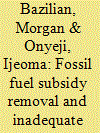|
|
|
Sort Order |
|
|
|
Items / Page
|
|
|
|
|
|
|
| Srl | Item |
| 1 |
ID:
088971


|
|
|
|
|
| Publication |
2009.
|
| Summary/Abstract |
This paper examines peat power production in Ireland under the three pillars of energy policy-security, competitiveness and environment. Peat contributes to energy security-as an indigenous fuel, it reduces dependency on imports. During a period of low capacity margins, the operation of the peat plants is useful from a system security perspective. Peat generation is being financially supported by consumers through an electricity levy. The fuel also has high carbon intensity. It is not politically viable to consider peat on equal economic criteria to other plant types because of history and location. This paper reviews electricity generation through combustion of peat in Ireland, and quantifies the costs of supporting peat utilising economic dispatch tools, finding the subsidy is not insignificant from a cost or carbon perspective. It shows that while peat is beneficial for one pillar of energy policy (security), the current usage of peat is not optimal from a competitiveness or environmental perspective. By switching from the current 'must-run' mode of operation for peat to the 'dispatched' mode used for the other generation, significant societal savings (in the range €21 m per annum) can be achieved, as well as reducing system emissions by approximately 5% per year.
|
|
|
|
|
|
|
|
|
|
|
|
|
|
|
|
| 2 |
ID:
113410


|
|
|
|
|
| Publication |
2012.
|
| Summary/Abstract |
We briefly consider the impact of fossil fuel subsidy removal policies in the context of inadequate power supply, with a focus on the implications for businesses. In doing so, we utilize the case of the early 2012 fuel subsidy removal in Nigeria. The rationale for such subsidy-removal policies is typically informed by analysis showing that they lead to an economically inefficient allocation of resources and market distortions, while often failing to meet intended objectives. However, often the realities of infrastructural and institutional deficiencies are not appropriately factored into the decision-making process. Businesses in many developing countries, already impaired by the high cost of power supply deficiencies, become even less competitive on an unsubsidized basis. We find that justifications for removal often do not adequately reflect the specific environments of developing country economies, resulting in poor recommendations - or ineffective policy.
|
|
|
|
|
|
|
|
|
|
|
|
|
|
|
|
| 3 |
ID:
149846


|
|
|
|
|
| Summary/Abstract |
When considering renewable energy, Pacific Island Countries (PICs) focus on energy security and affordability as primary benefits. In Melanesia, access to modern energy services represents a major unfinished agenda. To that end, Pacific Energy Ministers have endorsed the Framework for Action on Energy Security in the Pacific (FAESP) in April 2011. The associated implementation plan (IPESP) was developed, however never formally endorsed. PICs have instead taken a pathway towards national energy transition roadmaps. This paper describes the current status of the energy sector in PICs, the main challenges and the barriers to the deployment of renewable energy and the role of international cooperation in accelerating deployment. In the context of this analysis, technology cooperation is treated as the sum of cooperation on “orgware”, software and hardware. These three dimensions are explored in the context of the Pacific energy sector, looking at how development finance (DF) is currently distributed among them. Looking at the key barriers identified and the areas where DF has been focused to date, this paper proposes a framework for removal of barriers to the deployment of renewable energy in the Pacific through more focused use of DF and technical cooperation. The framework identifies key goals, actors, activities, resources necessary and indicators to monitor progress.
|
|
|
|
|
|
|
|
|
|
|
|
|
|
|
|
| 4 |
ID:
171496


|
|
|
|
|
| Summary/Abstract |
This policy perspective sums up the main input of four members of the Research Panel for IRENA's Global Commission on the Geopolitics of the Energy Transformation. The geographic and technical characteristics of renewable energy systems are fundamentally different from those of coal, oil, and natural gas. This has implications for interstate energy relations and will require early attention if states are to exploit opportunities and address challenges. We point to six clusters of renewables' geopolitical implications that will manifest themselves over different time horizons. Overall, a generally positive disruption is foreseen, but also one that raises new energy security challenges. Moreover, while renewables will eventually render energy relations more horizontal and polycentric, achieving a smooth transition will not be easy. Renewables alter arenas of energy interaction, transforming markets and shifting trade partners, and reshape patterns of cooperation and conflict among countries. One possible outcome is a world of continental-sized grid communities made up of prosumer countries that continuously strategize between secure domestic production and cheap imports. Political action is required to manage, inter alia, industrial competition, stranded assets, availability of electricity and storage capacity, critical materials, and rivalry over ownership of key infrastructure assets.
|
|
|
|
|
|
|
|
|
|
|
|
|
|
|
|
| 5 |
ID:
091524


|
|
|
|
|
| Publication |
2009.
|
| Summary/Abstract |
In 2006, energy-related CO2 emissions from transport energy in Ireland were 168% above 1990 levels. Private cars were responsible for approx 45% of transport energy demand in 2006 (excluding fuel tourism). The average annual growth of new cars between 1990 and 2006 was 5.2%. This paper focuses on these new cars entering the private car fleet, in particular the purchasing trend towards larger size cars. This has considerably offset the improvements in the technical efficiency of individual car models. The analysis was carried out on the detailed data of each individual new vehicle entering the fleet in 2000-2006. The average CO2 emissions per kilometre for new petrol cars entering the Irish fleet grew from 166 to 168 g CO2/km from 2000 to 2005 and reduced to 164 in 2006. For diesel cars the average reduced from 166 in 2000 to 161 in 2006. The paper also discusses how a recent change in vehicle registration taxation and annual motor tax had a significant impact purchasing trends by supporting lower emission vehicles. Cars with emissions up to 155 g CO2/km represented 41% of new private cars sold in Ireland in 2007 compared with 84% during the period July-November 2008.
|
|
|
|
|
|
|
|
|
|
|
|
|
|
|
|
| 6 |
ID:
105794


|
|
|
|
|
| Publication |
2011.
|
| Summary/Abstract |
We briefly consider the tensions between climate change and energy security policy imperatives, and highlight some concepts that may bring additional clarity to decision-making at the nexus of the two areas. We focus on developing countries and use the case of the Medupi supercritical coal plant in South Africa. The justification for the plant's construction stemmed from an Integrated Resource Planning process informed by South Africa's national utility. Often, as in the case of South Africa, there are tensions not easily captured in quantitative algorithms between, inter alia, a lack of access to electricity by millions of people (and associated welfare losses) and greenhouse gas emissions from electricity generation. It is difficult to identify any formal processes that have prioritised climate change considerations over those of energy access. Thus, it becomes imperative to have a clear understanding of the consequences of this reality when considering power system expansion. We find that the processes often employed do not provide an entirely satisfactory precedent for future planning analyses, and the justifications do not adequately reflect the complexity of the decision space. Finally, we highlight some options by which these tools might be enhanced in areas including explicit and formal consideration of risk.
|
|
|
|
|
|
|
|
|
|
|
|
|
|
|
|
| 7 |
ID:
098555


|
|
|
|
|
| Publication |
2010.
|
| Summary/Abstract |
One hundred years before the advent of modern power systems, William Blake in The Marriage of Heaven and Hell argued with the Devil asserting that "Energy is Eternal Delight". That delight however, remains beyond the reach of the two to three billion of people disadvantaged by a lack of modern energy services-a number that has remained relatively unchanged over recent decades. This is arguably the most disturbing of insights from an examination of global energy-use trends, and a simple, clear justification for a political prioritisation of the issue.
It is widely accepted that a lack of access to energy services is a fundamental hindrance to human, social, and economic development. Addressing it comprehensively would have enormous multiple benefits. However, current efforts are woefully insufficient in scale, scope, and design, and attempting to address the issue solely as part of wider poverty reduction policies is likely to be sub-optimal. We discuss energy policy (with a focus on energy security) as an effective vehicle for large-scale action in providing modern, clean energy services. To this end, we outline specific and limited examples of where international cooperation could play a role supporting national actions and ensuring universal access.
|
|
|
|
|
|
|
|
|
|
|
|
|
|
|
|
| 8 |
ID:
115641


|
|
|
|
|
| Publication |
2012.
|
| Summary/Abstract |
Informed energy decision making requires effective software, high-quality input data, and a suitably trained user community. Developing these resources can be expensive and time consuming. Even when data and tools are intended for public re-use they often come with technical, legal, economic and social barriers that make them difficult to adopt, adapt and combine for use in new contexts. We focus on the promise of open, publically accessible software and data as well as crowdsourcing techniques to develop robust energy analysis tools that can deliver crucial, policy-relevant insight, particularly in developing countries, where planning resources are highly constrained-and the need to adapt these resources and methods to the local context is high. We survey existing research, which argues that these techniques can produce high-quality results, and also explore the potential role that linked, open data can play in both supporting the modelling process and in enhancing public engagement with energy issues.
|
|
|
|
|
|
|
|
|
|
|
|
|
|
|
|
| 9 |
ID:
111465


|
|
|
|
|
| Publication |
2012.
|
| Summary/Abstract |
Greater detail on the specific technological and planning challenges facing energy-deprived developing economies is required to improve energy policy making and development assistance practice. The current literature tends to highlight electricity services, and, to a lesser extent, clean cooking. This article calls for a closer look at mobility and mechanical power as essential energy services in addition to a refinement of the specific institutional arrangements needed to reduce energy poverty and deprivation. This article augments and refines arguments made by Morgan Bazilian and his colleagues in their viewpoint "More Heat and Light".
|
|
|
|
|
|
|
|
|
|
|
|
|
|
|
|
|
|
|
|
|